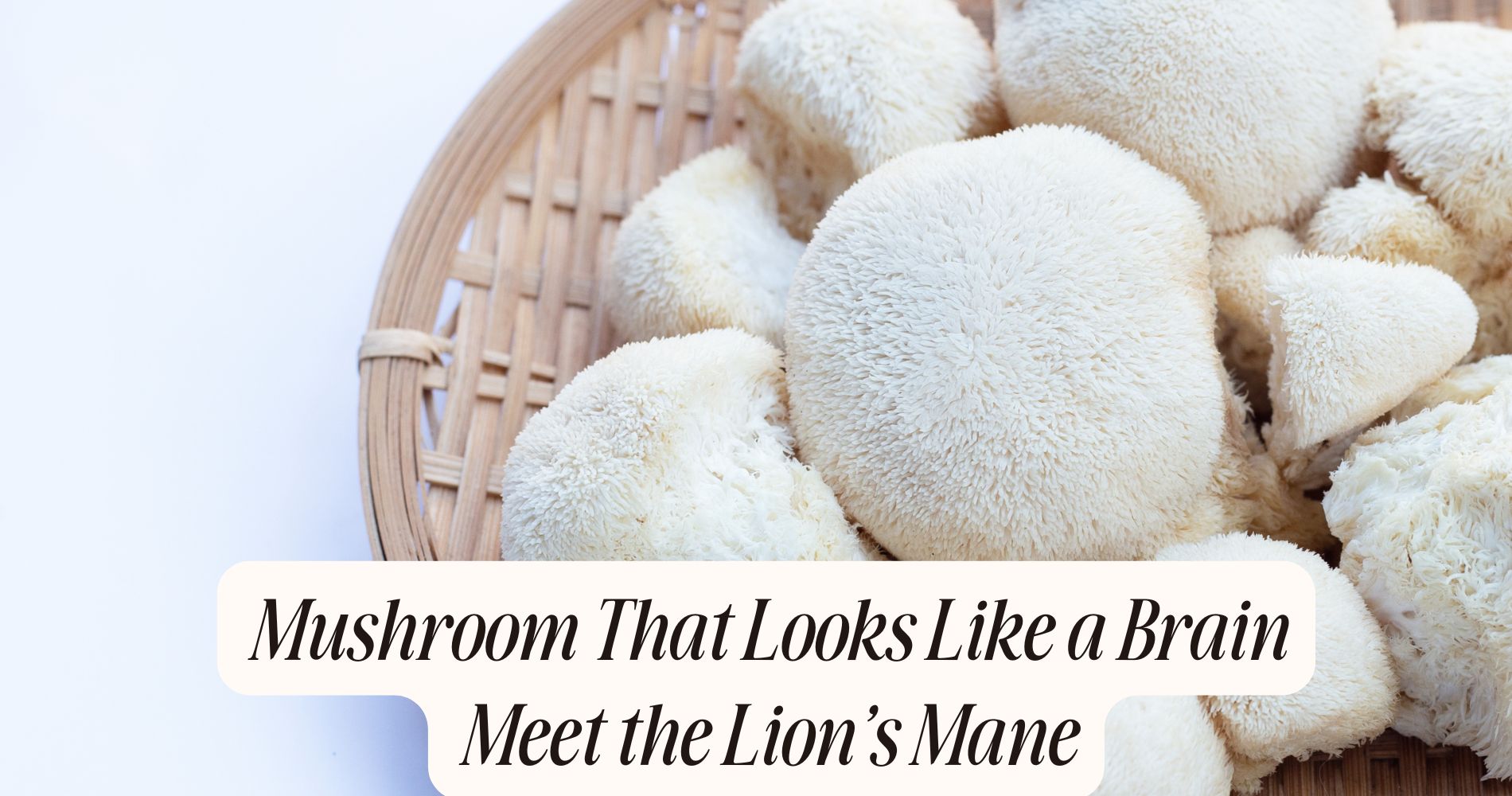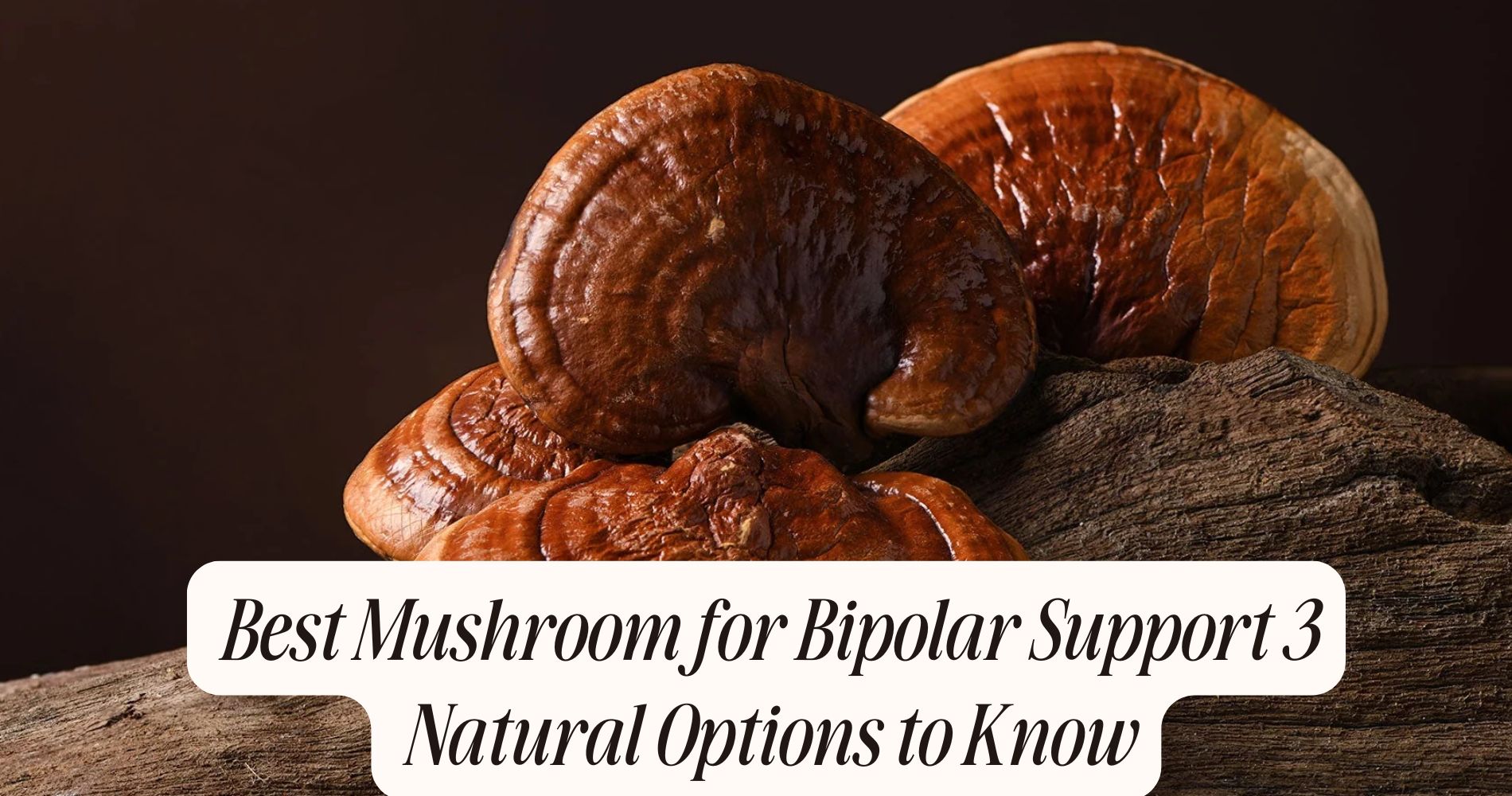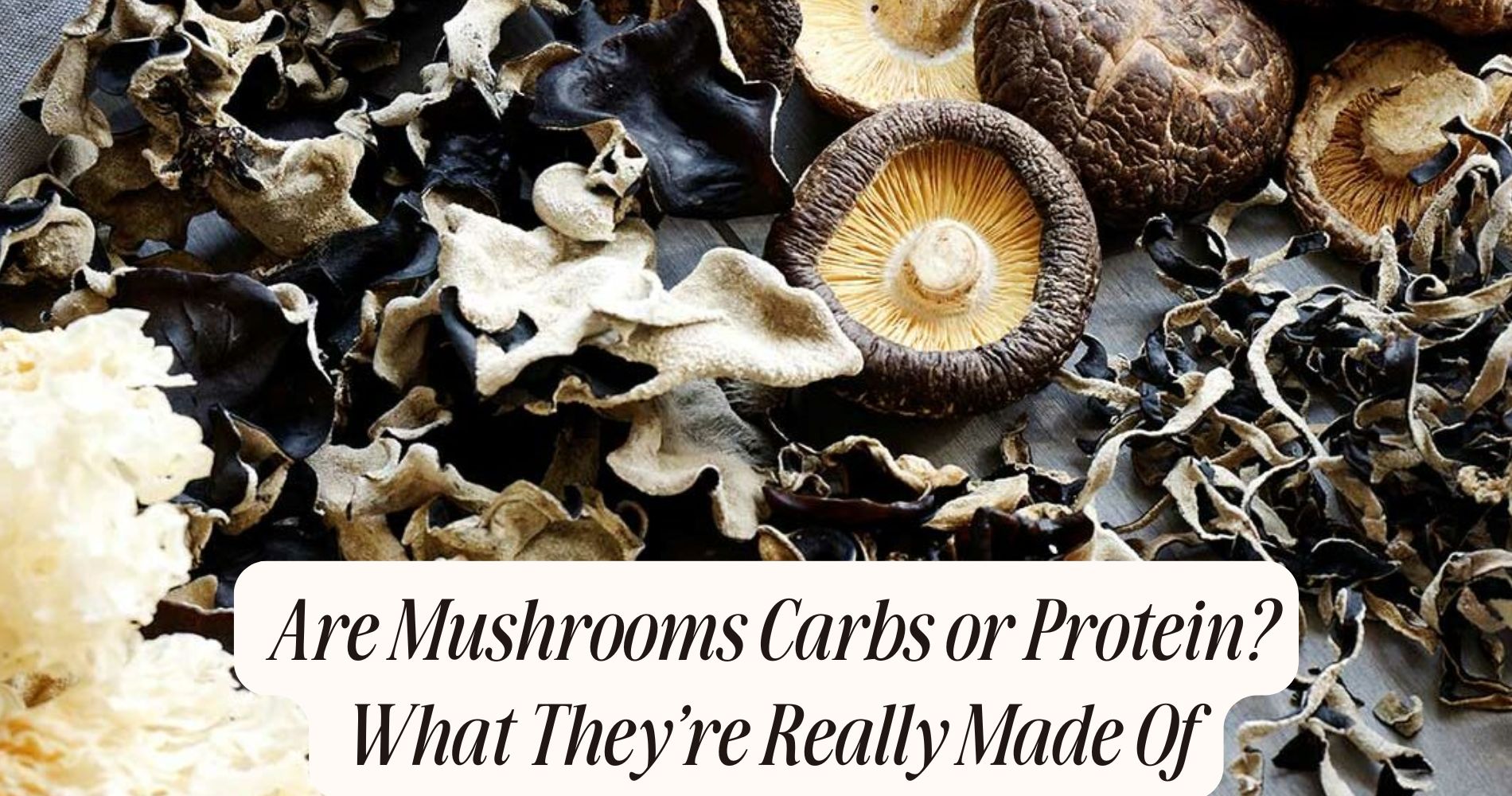
Mushroom That Looks Like a Brain Meet the Lion’s Mane
The mushroom that looks like a brain, Lion’s Mane (Hericium erinaceus), is as fascinating as it is functional. With its cascading tendrils and neural resemblance, this unique fungus has captured attention not just for its appearance but for its powerful health benefits. Known to support nerve regeneration and boost cognitive clarity, Lion’s Mane is rich in antioxidants and neuroprotective compounds. Dive in to discover how this extraordinary mushroom can elevate your wellness routine—both in your kitchen and in your mind.
What Is Lion’S Mane Mushroom?
Lion's Mane mushroom, scientifically known as Hericium erinaceus, is a distinctive fungus recognized for its striking appearance and potential health benefits. You’ll find lion's mane classified among medicinal mushrooms, which are celebrated for their therapeutic properties.
This mushroom is primarily found in temperate forests, thriving on decaying hardwood trees. Its unique composition includes bioactive compounds like erinacines and hericenones, which may promote nerve growth and cognitive function.

Research suggests that regular consumption of lion's mane can support brain health, enhance memory, and even alleviate symptoms of anxiety and depression.
Unique Appearance: The Brain-Like Features
The lion's mane mushroom showcases a remarkable resemblance to the human brain, featuring a cluster of long, white spines that mimic the texture of cerebral tissue. This unusual shape not only distinguishes it from other fungi but also contributes to its intriguing allure.
Each spine, or "tooth," extends outward, creating a cascading effect that resembles the convolutions of the brain. As you observe the mushroom, you'll notice how its unique appearance can evoke curiosity and admiration.
The brain texture is evident in the way the spines softly taper, enhancing its overall resemblance to neurological structures. This fascinating morphology has made the lion's mane a subject of interest in both culinary and medicinal discussions, highlighting its distinct visual characteristics.
Nutritional Profile: A Superfood Revealed
While you might be drawn to its unique appearance, the lion's mane mushroom also boasts an impressive nutritional profile that makes it a superfood. This mushroom is known for its high nutrient density, offering a rich array of vitamins, minerals, and antioxidants.
It’s particularly abundant in polysaccharides, which contribute to its health benefits, including immune support and anti-inflammatory properties. Additionally, lion's mane is a good source of fiber, promoting digestive health and overall well-being.

Incorporating this mushroom into your diet can enhance your meals while providing essential nutrients. Whether consumed fresh, dried, or in supplement form, its impressive nutritional content makes it a valuable addition to any health-conscious diet, supporting various aspects of wellness effectively.
Cognitive Benefits: Enhancing Brain Function
As you explore natural ways to enhance brain function, you might find lion's mane mushroom particularly intriguing due to its cognitive benefits.
Research suggests that lion's mane promotes cognitive enhancement by stimulating the production of nerve growth factor (NGF), which is essential for neuronal health.
By incorporating this mushroom into your diet, you could experience improved mental clarity, heightened focus, and better memory retention.
Regular consumption may help combat age-related cognitive decline, making it a valuable addition for those looking to maintain sharpness as they age.
Whether consumed in supplement form or as part of your meals, lion's mane may offer a practical approach to support and enhance your overall brain function.
Nerve Health: Promoting Neurogenesis
When you prioritize nerve health, you're fundamentally fostering an environment conducive to neurogenesis, the process through which new neurons are formed in the brain.
By engaging in practices that support neurogenic pathways, such as regular exercise and cognitive challenges, you enhance your brain's plasticity. This not only promotes the growth of new neurons but also strengthens existing connections, leading to improved cognitive resilience.

Nutritional factors, particularly those rich in antioxidants and omega-3 fatty acids, play a crucial role in this process as well. Incorporating substances like Lion's Mane mushroom may further support these neurogenic pathways, bolstering your brain's capacity to adapt and thrive.
Ultimately, nurturing your nerve health is key to sustaining cognitive robustness and longevity.
Culinary Uses: Cooking With Lion’S Mane
Lion's Mane mushroom offers a unique culinary experience, boasting a texture reminiscent of seafood and a flavor profile that’s both earthy and slightly sweet.
When cooking with Lion’s Mane, you can explore various techniques such as sautéing, grilling, or roasting to enhance its natural flavors. Sautéing in butter or olive oil allows for a crispy exterior, while grilling can impart a smoky depth.
For ideal flavor pairings, consider combining Lion’s Mane with garlic, shallots, or fresh herbs like thyme and parsley. It also complements grains, risottos, or pasta dishes exceptionally well.
Experimenting with these cooking techniques and flavor pairings can elevate your dishes, making Lion’s Mane not just an ingredient but a centerpiece in your culinary repertoire.
Traditional Medicine: Historical Significance
Historically, the use of Lion's Mane mushroom in traditional medicine stems from its rich profile of bioactive compounds, which have been valued in various cultures for centuries.
In traditional practices, this mushroom was often included in historical remedies aimed at enhancing cognitive function and overall well-being. Ancient Chinese medicine recognized its potential for improving mental clarity and reducing stress, while indigenous cultures utilized it for its potential neuroprotective properties.
You might find it interesting that these traditional applications often laid the groundwork for modern herbal practices. By understanding its historical significance, you can appreciate how Lion's Mane has been revered not only as a culinary delight but also as an essential component in the tapestry of traditional healing practices around the world.
Modern Research: Evidence of Health Benefits
Recent studies have begun to substantiate the traditional claims surrounding Lion's Mane mushroom, revealing its potential health benefits through rigorous scientific investigation.
Clinical studies indicate that this unique fungus may enhance cognitive function, particularly in memory and focus. Research demonstrates that compounds within Lion's Mane stimulate nerve growth factor (NGF) production, which is essential for neuronal health.

Additionally, some clinical trials suggest it may reduce symptoms of anxiety and depression, potentially improving overall mental wellness.
While these health claims are promising, further research is necessary to fully understand the extent of Lion's Mane's benefits and mechanisms.
How to Grow Lion’s Mane at Home
If you're looking to cultivate Lion's Mane mushroom at home, you'll find that the process is both rewarding and manageable.
Start by selecting a suitable growing medium, such as hardwood sawdust or sterilized straw, which provides the necessary nutrients. You'll need to inoculate this medium with Lion's Mane spawn.
Next, maintain ideal environmental conditions: keep the temperature between 60-75°F (15-24°C) and guarantee high humidity levels, around 85-95%. A covered container can help retain moisture.
Once the mycelium colonizes the medium, introduce fresh air and light to stimulate fruiting.
Within a few weeks, you should see the distinctive, fluffy growths of Lion's Mane emerging. Harvest when they're firm and white, and enjoy your home-grown mushrooms!
Safety and Side Effects: What You Should Know
While Lion's Mane mushrooms are generally considered safe for consumption, it’s important to be aware of potential side effects and interactions. Some individuals may experience potential allergies, such as skin rashes or gastrointestinal discomfort.
If you have a history of mushroom allergies, approach Lion's Mane with caution.
Dosage recommendations typically suggest starting with small amounts—around 500 mg to 1,000 mg daily—and gradually increasing as needed. Always consult a healthcare professional before beginning any new supplement, especially if you’re pregnant, nursing, or taking medications.
Monitoring your body's response is essential; discontinue use if you experience adverse effects. By being informed and cautious, you can safely enjoy the benefits of Lion's Mane mushrooms.
Brain Boost in a Gummy Bite
If you’re intrigued by the brain-like appearance and powerful benefits of Lion’s Mane, you’ll love how easy it is to harness its potential with SUPER MUSHROOM GUMMIES from Well Gummies. Each tasty chew is packed with 10 functional mushrooms—including Lion’s Mane—to support sharper focus, calm energy, and immune balance. No need to brew teas or cook mushrooms—just pop a delicious wild berry gummy and fuel your brain the natural way. No jitters, no crash—just clean, consistent clarity to help you shine all day.
Frequently Asked Questions
Where Can I Buy Lion’S Mane Mushrooms?
You can buy lion’s mane mushrooms from various online retailers like Amazon or specialty stores. Additionally, check your local markets or health food stores, as they often carry fresh or dried versions of this unique mushroom.
How Do I Store Lion’S Mane Mushrooms?
To store lion’s mane mushrooms, use airtight containers in the refrigerator. Keep them in a cool, dark place with high humidity—ideal conditions for freshness. Employ these storing techniques to maintain flavor and texture for longer.
Can I Consume Lion’S Mane Raw?
You can consume lion’s mane mushrooms raw, but cooking them enhances their digestibility and flavor. While raw consumption offers health benefits, cooking may increase bioavailability of nutrients, maximizing their potential advantages for your well-being.
Are There Any Allergies Associated With Lion’S Mane?
Allergic reactions to lion's mane are rare, but they can occur. If you experience symptoms like itching, swelling, or difficulty breathing after consumption, it's essential to seek medical advice to guarantee your safety.
How Long Does It Take to Grow Lion’S Mane?
Growing lion’s mane typically takes 7 to 14 days under ideal growth conditions. For successful cultivation, maintain humidity and temperature, and follow specific cultivation tips to guarantee healthy fruiting and robust growth.
Conclusion
To summarize, Lion's Mane mushroom is a remarkable fungus with a brain-like appearance, offering an impressive array of nutritional and cognitive benefits. Its potential to enhance brain function and promote nerve health makes it a valuable addition to your diet or wellness routine. With growing interest in its historical significance and modern research backing its health benefits, Lion's Mane stands out as a superfood worthy of exploration. Consider incorporating it into your meals or supplement regimen for peak brain support.




